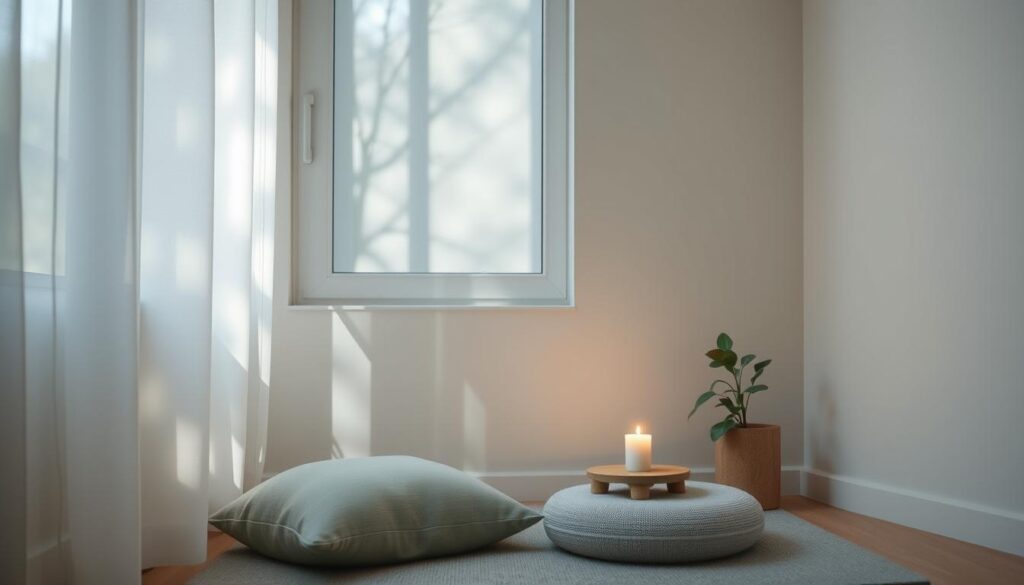“The key to transforming your life is a matter of minutes.” – Mahatma Gandhi
Finding time for self-care in today’s fast world seems hard. But, what if 10 minutes of daily meditation could bring deep peace and strength? Learn how quick meditations can change your busy life.
Key Takeaways
- 10-minute meditations are an achievable way to incorporate mindfulness into your daily routine
- Brief meditation sessions can improve focus, inner calm, and emotional resilience
- Establish a consistent morning meditation practice to cultivate mindfulness throughout your day
- Explore guided meditations and flexible approaches to find what works best for you
- Overcome common meditation challenges with expert tips and support
Understanding Quick Meditation Fundamentals
Meditation has been around for thousands of years. It’s a powerful tool for mental well-being and mindful living. But for those with busy lives, starting can seem hard. That’s where quick meditation comes in – it offers stress relief and clarity in just a few minutes a day.
What Makes Quick Meditation Effective?
Quick meditation quickly turns on the “rest and digest” response in your body. Even a 10-15 minute meditation session can calm your brain’s fear and anxiety centers. This helps you feel calm and clear, making it easier to handle a busy life.
The Science Behind Short Meditation Sessions
Research shows that even short meditation for beginners can greatly improve mental health. Studies found that 30 days of 10-minute Headspace meditations can cut stress by a third and boost life satisfaction. The key is to make meditation a regular habit to see lasting benefits.
Benefits for Mental Well-being
Adding brief meditation breaks to your day can greatly improve your mental well-being. It helps you handle life’s challenges better, improves focus, and builds emotional strength. Mindful living through quick meditation lets you face each day with clarity and calm.

10-Minute Meditations for Busy Lives: Getting Started
Finding time for meditation in today’s fast world can seem hard. But, just 10 minutes a day can change everything. Quick meditation techniques can bring calm, clarity, and peace, even on busy days.
Guided meditations are a great way to start. Apps like Head Space offer short, easy sessions. Many find meditating during lunch or before bed works well.
Quick meditation fits into any busy schedule. It can help you focus in the morning, reduce stress at mid-day, or relax before bed. There are many guided meditations online, from body scans to mindfulness exercises.
“Just 10 minutes of meditation can help me regain mental clarity and recharge. It’s become an essential part of my daily routine.”
Consistency is key to a good meditation habit. Start with 10 minutes a day and increase as you get into it. Remember, meditation is a practice – be patient and celebrate your progress.

Starting a quick meditation practice is a great investment in your mental health. So, why not give it a try? Your mind and body will appreciate it.
Creating Your Perfect Morning Meditation Routine
Starting your day with meditation can change everything. It makes your day more mindful, productive, and fulfilling. It helps you face daily challenges with ease.
Choosing the Right Time and Space
For a great morning meditation, pick the right time and place. Meditate early, before the day gets busy. Try waking up 10-20 minutes early to fit it in.
Find a quiet, comfy spot in your home. It could be a cozy corner or your bed if it’s peaceful. Make sure it’s well-lit and calm, with everything you need nearby.
Essential Elements of Morning Practice
- Breath Awareness: Focus on your breathing to relax and be present.
- Intention Setting: Start with a goal, like being grateful or productive.
- Affirmations: Say positive things to yourself to believe in your dreams.
- Visualization: Imagine your day going smoothly and successfully.
Overcoming Common Morning Obstacles
Starting a morning meditation routine is tough, but doable. You might struggle with time, distractions, or feeling unmotivated. Here’s how to beat these:
- Wake up 10 minutes earlier each day to grow your meditation time.
- Turn off your phone and close tabs to avoid distractions.
- Do some stretching or a short walk to wake up.
- See your meditation as a must-do, like any other important task.
By starting a morning meditation routine, you begin a journey of mindful living. It will improve your daily practice in many ways. Stay committed, be patient, and enjoy the amazing changes it brings.
Mindfulness Techniques for Stress Relief
In today’s fast world, stress is common. But, mindfulness offers a strong way to fight it. By living in the now and paying attention to our feelings and body, we can find peace.
Breath awareness is a key mindfulness practice. It helps you stay present and stop worrying. You can do it anywhere, even at work.
The body scan is another great tool. It helps you notice and release body tension. It’s good for stress-related aches and pains.
Loving-kindness meditation is also powerful. It builds kindness, for you and others. This can help fight stress and bring more connection and happiness.
Adding these meditation techniques to your day can change how you handle stress. Even a few minutes a day can make a big difference for your health.
“Mindfulness is not about eliminating stress, but about recognizing and managing it in a healthier way.”
For stress relief through mindfulness, be kind to yourself. Keep trying these practices. They can help you find peace and strength, even when things get tough.
Incorporating Meditation into Your Workday
In today’s fast-paced world, taking care of your mental health is crucial. Quick meditation can change your day, helping you balance work and life, reduce stress, and increase productivity.
Desktop Meditation Breaks
Research shows that a 10-15 minute meditation break can greatly improve your day. It helps lower stress, improves focus, and boosts your mood. Try setting a timer during your lunch or mid-afternoon break for a quick meditation session at your desk.
Mindful Moments Between Meetings
Workdays are filled with meetings, making it hard to stay focused. Use the time between meetings for mindfulness. A minute or two of deep breathing or a body scan can refresh your mind and prepare you for the next task.
Quick Stress-Release Exercises
When work gets too much, having quick stress-relief tools is key. Try desk stretches, neck and shoulder rolls, or a short meditation app session. These breaks can give you the energy and focus to tackle your work again.
Adding meditation to your workday is easy. Start small, find what works for you, and see how it changes your day. Your mind, body, and work will benefit greatly.
Building Emotional Resilience Through Brief Meditation
In today’s fast-paced world, finding time for self-care can seem hard. Yet, even short moments of mindfulness can greatly improve your emotional strength and mental health. Quick meditation practices help you understand yourself better and manage your feelings more easily.
A special resource is available – a set of guided meditation scripts. They help you build emotional resilience in just 10, 20, or even fewer minutes. These sessions teach you to be present, connect with your body and breath, and notice all feelings, from tension to calm. By accepting your emotions without judgment, you start to be kinder and more accepting of yourself.
Research in psychology and neuroscience highlights the power of positive affirmations. Saying things like “I am at peace,” “I can handle anything,” or “I am strong and resilient” can fight negative thoughts and boost self-confidence. These affirmations, included in the meditation scripts, help build resilience by creating a positive story about yourself.
Starting your day with a 10-minute mindfulness session or taking a few moments to breathe between meetings can change your emotional health. By making mindfulness a regular part of your routine, you’ll not only become more resilient but also find more peace and clarity in your life.
The path to emotional resilience is not about being perfect but about gently exploring your inner world. Embrace this journey, trust your instincts, and let these short meditations become a vital part of your self-care.
Guided vs. Unguided Quick Meditation Sessions
Quick meditation practices come in two forms: guided and unguided. Guided meditations are led by an expert and are great for beginners. They use soothing voices, images, and sounds to help you relax and focus.
Unguided meditation, on the other hand, lets you practice on your own. As you get better, it helps you feel more in control of your mind and feelings. It teaches you to use your own inner strength and intuition.
Benefits of Each Approach
- Guided meditation offers a sense of safety and direction, especially for newbies.
- Unguided meditation builds self-reliance and mindfulness, letting you tailor your practice to your needs.
- Guided sessions are good for tackling stress, anxiety, or sleep issues.
- Unguided meditation gives you the freedom to explore your own meditation path.
Choosing What Works Best for You
Choosing between guided and unguided meditation depends on your preferences and goals. Many start with guided meditations and then move to unguided ones as they grow more confident.
Tools and Resources
| Guided Meditation Resources | Unguided Meditation Resources |
|---|---|
|
|
Try both guided and unguided meditation to see what works best for you. Mixing different styles can help you build a strong and lasting meditation practice that supports your well-being.
Overcoming Common Meditation Challenges
Starting your meditation for beginners journey comes with challenges. You might face restlessness, mind-wandering, or find it hard to find time. But, with the right strategies, you can overcome these obstacles and deepen your meditation.
Staying focused is a common challenge. Studies show that one in three beginners find distractions hard. It’s normal for your mind to wander. Gently bring your attention back to your breath or the present moment. With time and consistency, your focus will improve.
Restlessness is another hurdle, especially for newbies. About half of people struggle to stay focused. It’s okay to have thoughts and feelings arise. Acknowledge them without judgment and return to your practice. Starting with just 5 minutes upon waking up can help establish a consistent daily practice.
Expecting immediate benefits is a common mistake. About 20% of beginners expect instant results, leading to disappointment. Patience and self-compassion are key. Regular meditation can change your brain, helping you manage emotions and stress better. Start with just 3 minutes a day and gradually increase your sessions as you build your practice.
You’re not alone in your meditation journey. Joining a meditation meetup or following online meditation for beginners resources can offer the support and guidance you need. This can help you overcome challenges and deepen your mindful living experience.
| Common Challenge | Percentage of Beginners Affected | Suggested Strategies |
|---|---|---|
| Distractions | 33% | Gently bring attention back to breath or present moment |
| Restlessness | 50% | Acknowledge thoughts and feelings without judgment, return to practice |
| Expectation of Instant Benefits | 20% | Practice patience and self-compassion, start with 3 minutes daily |
The journey of meditation for beginners is not about being perfect. It’s about self-discovery and growth. By embracing challenges and using the right strategies, you can develop a consistent daily practice that nurtures your mindful living.
“The journey of meditation is not about perfection, but rather about self-discovery and growth.”
Conclusion
Discovering 10-minute meditations can change your life. They help with stress, improve your mind, and make life better. Even short meditations can make a big difference.
Start small and be patient. It’s okay if it’s hard to meditate every day at first. Try different types of meditation to find what works for you. You can also mix meditation with other activities like yoga or walks.
Embrace the journey and stick with it. With time, meditation will become a big part of your life. It will help your mental health, relationships, and happiness. You’re not alone in this journey. Many people have seen big changes in their lives by taking small steps towards mindfulness. So, take a deep breath and let’s keep going together.
FAQ
What are the key benefits of incorporating 10-minute meditations into busy lives?
Regular 10-minute meditations can help reduce stress and boost mindfulness. They also improve mental well-being. These short moments of calm help build emotional strength and focus.
They also help you stay balanced in your life. This is especially true for those with busy schedules.
How can I create a consistent morning meditation routine?
To start a morning meditation, pick a time and place that fits your life. Focus on breathing and setting intentions. Be kind to yourself as you begin.
Find ways to deal with time and distractions. This will help you stick to your routine.
What mindfulness techniques can I use to alleviate stress in my daily life?
Techniques like breath awareness and body scans can reduce stress. Loving-kindness meditation also helps. These practices increase present moment awareness and self-compassion.
They help manage stress and improve both mental and physical health.
How can I integrate meditation into my work routine?
Take short meditation breaks at work, like desktop sessions. Use mindful moments between meetings. These can boost focus and productivity.
Find discreet ways to release stress at work. This can improve your overall well-being.
What are the advantages of guided versus unguided meditation sessions for quick practices?
Guided meditations are great for beginners, offering structure. Unguided meditations give more freedom to develop your own practice. Try both to see what suits you best.
How can I overcome common obstacles in establishing a regular meditation practice?
Challenges like restlessness and mind-wandering are normal. Stay motivated by setting achievable goals and practicing flexibility. View obstacles as chances to grow.
Consistency and patience are crucial for a lasting meditation habit.




























































